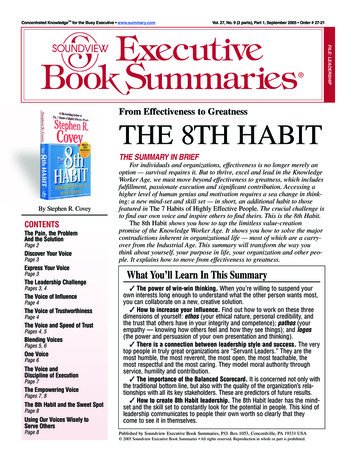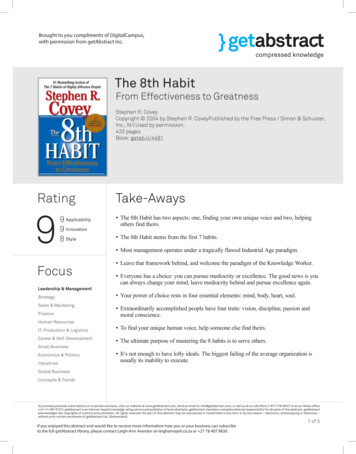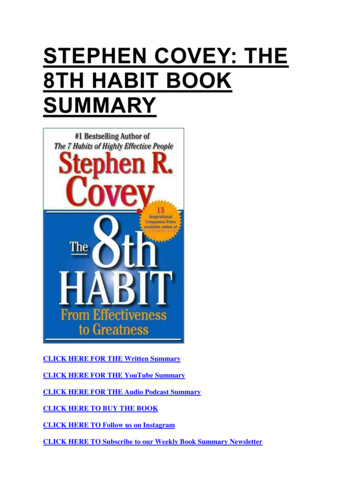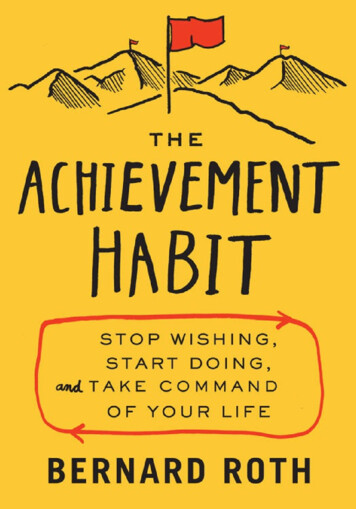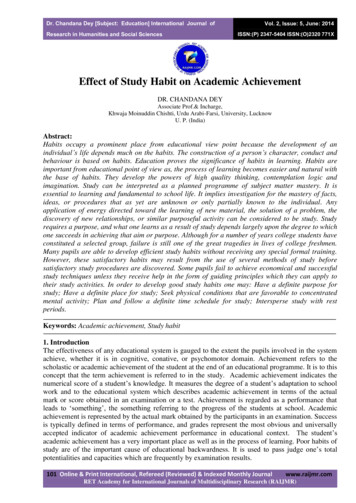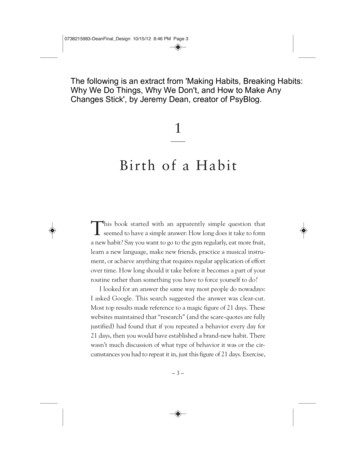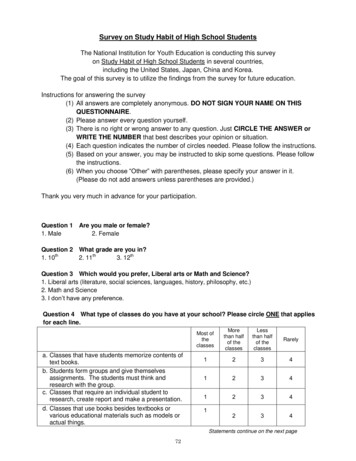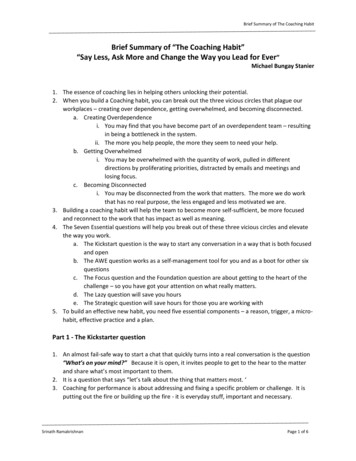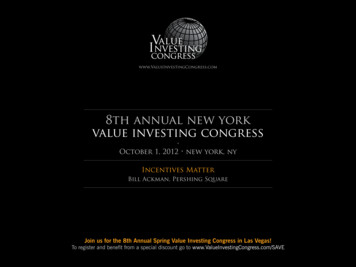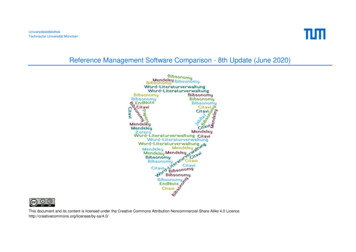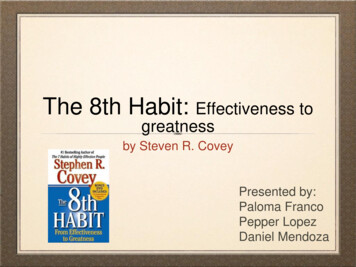
Transcription
The 8th Habit: Effectiveness togreatnessby Steven R. CoveyPresented by:Paloma FrancoPepper LopezDaniel Mendoza
Outline of PresentationAbout the AuthorSummary of Book New reality of the 7th Habit -- The 8th HabitYour Voice and others ActivityBook CritiqueHow to Apply to SA
About theAuthor:Steven R. Covey Writer, Inspirational Speaker, and Teacher Educational Background: B.S. in Business Administration from theUniversity of Utah, Salt Lake City M.B.A. in Business Administration fromHarvard University Doctorate in Religious Education fromBrigham Young University Recognized as one of Time magazine’s 25most influential Americans Legacy: Principle-Centered Leadership Passed on July 6, 2012 due to medicalcomplications from a bicycling accidentthat happen earlier in April that year atRock Canyon Park in Provo, Utah
What follows is a subjective attempt to be relatively objective and presentSummary of the Book:The 8th Habit:From Effectiveness toGreatnessby Stephen R. CoveyAuthor of The Seven Habits of HIghlyEffective People
Part 2: Inspire Others toFind their VoiceLeadership Defined“Leadership is communicating to people their worth and potentialso clearly that they come to see it in themselves” (Covey, 2004)Goal in Part 2: “ is to help [the reader] discover how, by workingand struggling to solve your personal challenges and problems,you can greatly increase your own influence and the influence ofyour organization - whether it be your team, department, division orentire organization, including your family”There is great importance to grasp the “whole person” view in orderto understand and solve problems happening in your organization
New Knowledge Worker AgeSEVEN Seismic shift that characterize the new knowledge worker ageThe Globalization of Markets and TechnologiesThe Emergence of Universal ConnectivityThe Democratization of Information/ ExpectationsAn Exponential increase in competitionThe Movement of Wealth Creation from Financial Capital to Intellectualand Social CapitalFree AgencyPermanent White water
Two kinds of problems in both thephysical body and in organizations :Chronic and acuteWhole person paradigm allows one to seeboth the chronic and acute problems thathappen in org when they neglect themind, body, heart, or spirit of its people.
Things that need managing (Controlling):Things without freedom to chooseMoneyStructuresPhysical ResourcesCostsSystemsFacilitiesInformation ProcessesToolsTimeInventorySometimes.“People” choose to be managed under their ownleadershipCovey suggest that we must moveaway from this and move towards --
What successful leaders do?SET DIRECTIONDEMONSTRATE PERSONAL CHARACTERMOBILIZE INDIVIDUAL COMMITMENTENGENDER ORGANIZATIONAL CAPABILITY(Ulrich, Zengar, Smallwood, Results-BasedLeadership)
Inspiring others tofind their voice aHABIT bydeveloping theirATTITUDE, SKILLand KNOWLEDGEby focusing onModelingPathfindingAligningEmpowering
Focus: Modeling & PathfindingThe voice of InfluenceThe voice of TrustworthinessThe voice of Speed of TrustBlending VoicesOne Voice
The Voice of InfluenceBecoming a trim-tab“A trim-tab on a boat or plane is the smallrudder that turns the big rudder that turns theship”----- A trim tab leader moves themselves andtheir team in a way that positively affects theentire organization.--Building trust
Voice of Trustworthiness“Trust is the key to all relationships, so also istrust the glue of organizations” (Covey, 2004, p147)
The voice and speed of trustWhen there is trust in a relationship, it becomeseasier to communicate10 deposits andwithdrawals we can makethat can have a profoundimpact of the level of trustin our relationships
Blending VoicesAlways seeking the Third Alternative--Third Alternative isn’t your way, isn’t our way-- itsour way. (Win-Win)Buddhists call this concept the middle way- “a highermiddle position that is better than either of the othertwo ways.”(Covey, 2004)
How do you accomplish that?Listening“To Truly listen means to transcend your ownautobiography, to get out of your frame of reference,out of your own value system, out of your own historyand judging tendencies, and to get deeply into theframe of reference of reference or viewpoint ofanother person.” (Covey, 2004, p. 192)
One Voice
Execution: Aligning & EmpoweringAligning Goals And Systems For Results (three options) Use both personal moral authority and formal authority to create systemsthat will formalize and institutionalize your strategy and principlesembodied in your shared vision and value Create cascading goals throughout the organization that are alignedwith your shared vision, values and strategic priorities Adjust and align yourselves to regular feedback you receive from themarket place and organization on how well you are meeting needs anddelivering value“You water what you want to grow”ALIGNMENT: Designing and executing systemsand structure that reinforce the core values andhighest strategic priorities of the organization Organizational trustworthiness Aligning requires constant vigilance Institutionalized moral authority
Releasing Passion And TalentRelease passion and talent creating a Knowledge Worker(three options) Directed autonomy through win-win agreements around cascading line of sightgoals and accountability for resultsKnowledge Worker“We live in an age of the knowledge worker,where intellectual capital is supreme.”
Empowering tools: Win-Win Empowerment: overlapping of organization’s needs & individual’s needs- Financial Health (physical)- Growth and Development (mental)- Meaning and Contribution (spiritual)- Synergetic Relationships with Stakeholders (social/emotional) Empowerment and Performance Appraisal“Big Boss” should become the humble servantHow is it going?What are you learning?What are your goals?How can I help you?
The Age of WisdomThe 8th Habit“The difference between what we are doing and what we arecapable of doing would solve most of the world’s problems” GandhiGoal: Find your inner voice and inspire others to find their own.Modeling and Pathfinding FOCUS (strategic work)Aligning and Empowering EXECUTION (creating structures)Six core drivers to execution:- Clarity- Enabling- Commitment- Synergy- Translation- Accountability
Three types of greatness are covered in this book:- Personal greatness- Leadership greatness- Organizational greatnessThe Sweet SpotThe 4 Disciplines of Execution- Focus on the wildly important- Create a compelling scoreboard- Translate lofty goals into specific actions- Hold each other accountable; all of the time
The 8th Habit: From Effectiveness to Greatness by Stephen R. Covey Author of The Seven Habits of HIghly Effective People. Part 2: Inspire Others to Find their Voice
